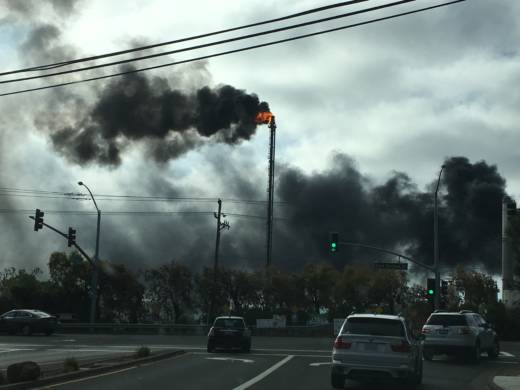Currently, the maximum fine against an oil company found liable for violating air quality rules is $10,000 a day, an amount critics have described as pocket change for the energy industry.
Dodd's bill would raise that to as much as $30,000 a day in cases where a refinery or power plant accident injures at least one person or impacts at least 25 people -- for instance, in an incident that leads to a shelter-in-place order.
Oil refiners that are found negligent would see fines go from a maximum of $25,000 to as much as $75,000 per day.
In rare cases, when a refinery knows about a violation but fails to correct it in a reasonable time, current law calls for a fine of up to $40,000 a day. The bill would raise the maximum to $125,000 a day.
In cases where an energy company intentionally violates an emissions rule, maximum fines would jump from $75,000 to $250,000 a day.
Penalties would also increase to as much as $500,000 a day for refineries responsible for the same serious violation within three years.
Environmentalists and local air regulators agree that the current penalties are not high enough to provide a financial incentive for the industry to avoid serious violations.
But Contra Costa County Supervisor John Gioia, who represents an area that's home to Richmond's Chevron refinery, says Dodd's proposal doesn't go far enough.
"We've had far too many chemical and refinery releases over the years and we need a higher penalty to provide even greater incentive for these companies to work even harder," said Gioia, who is a board member at the Bay Area Air Quality Management District.
"We would welcome the opportunity to work with Sen. Dodd to strengthen the bill so that it does truly have a meaningful impact on these facilities and protect public health," Gioia said.
The air district has sponsored previous legislative efforts to raise the fines.
For example in 2013, on the heels of a major fire at Richmond's Chevron facility, then state Sen. Loni Hancock, D-Berkeley, introduced legislation to raise the penalties higher than what Dodd is proposing. Under Hancock's measure, the maximum fine against a refinery found liable for a violation would rise to $100,000 a day.
That bill was approved by the state Senate but failed on the Assembly floor amid opposition from energy companies.
"Fines are so low. They are merely a cost of doing business for any large corporation," Hancock said. "They need to be greatly increased to provide an incentive for better safety practices."
Dodd, who's considered a moderate, business-friendly Democrat, says he understands the power of the energy industry.
"I do recognize that there's a huge lobby from the oil industry," Dodd said. "I've gotten some very difficult bills across the finish line."
The industry group that represents the region's refineries has yet to take a position on the bill.
"We are looking at Sen. Dodd's proposed legislation and how it might impact existing laws and air quality regulations," said Kevin Slagle, a spokesman for the Western States Petroleum Association.
"The safety and protection of our employees and the communities in which we operate are our members' top priority," Slagle said in an emailed statement.
The air district, which is in charge of investigating air quality violations, has long supported an increase in fines. But the agency says it won't announce whether it will back the legislation until a vote by its board of directors.
"The Bay Area air district has long supported efforts to reform the penalties for those who violate air quality laws," said Tom Addison, a senior policy adviser at the agency.
"There are some violations for which the penalties in statute today are inadequate. When people comply with air quality regulations, public health is protected," Addison said.
The bill is expected to face its first hearing next month, before the state Senate Environmental Quality Committee.
